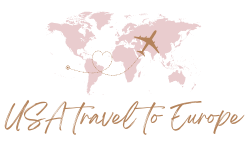How to Travel Cheap in Europe?

A friend of mine recently traveled to Budapest on a shoestring budget. She booked a hostel for $10 a night and took advantage of the city’s affordable public baths and free walking tours. By eating at local markets and bakeries, she managed to spend less than $15 a day on food. Her highlight was a visit to the famous Széchenyi Thermal Bath, which cost just $20 and provided a full day of relaxation. Does it sound impossible to you?
Traveling cheap in Europe is entirely possible with careful planning, flexibility, and a bit of adventurous spirit. By setting a budget, choosing affordable destinations, using budget transportation, and finding cost-effective accommodations and meals, you can experience the magic of Europe without draining your bank account. So pack your bags, grab your passport, and get ready to embark on the adventure of a lifetime. Check out best possible ways for cheap traveling in Europe.
Planning Your Trip
- Set a Budge– the first step in planning a cheap trip to Europe is setting a realistic budget. Determine how much you can afford to spend and stick to it. This will guide your decisions on where to go, how to get there, and where to stay.
- Choose Affordable Destination– not all European countries are created equal in terms of cost. While Western Europe can be expensive, Eastern Europe offers a more budget-friendly option without sacrificing beauty and culture. Consider destinations like Poland, Hungary, Bulgaria, and Romania, where your dollar will stretch further.
- Travel During Off-Peak Seasons– traveling during the shoulder seasons—spring (April to June) and fall (September to November)—can save you a lot of money. Flights and accommodations are cheaper, and popular tourist spots are less crowded.
- Look for Flight Deal- be flexible with your dates and airports. Use flight comparison websites like Skyscanner or Google Flights to find the best deals. Consider flying into a less popular city and using budget airlines or trains to get to your final destination.
Getting Around Europe
- Embrace Budget Airlines– Europe is home to several budget airlines, such as Ryanair, EasyJet, and Wizz Air. These airlines offer cheap flights between major cities, often for less than the cost of a train ticket. Keep in mind that they charge for extras like checked luggage and seat selection, so pack light and be prepared.
- Utilize Trains and Buses– train travel in Europe can be both scenic and economical, especially if you book in advance. Consider purchasing a Eurail Pass if you plan to travel extensively by train. Buses are another cost-effective option, with companies like FlixBus and Eurolines offering extensive routes across the continent.
- Rent a Car– for exploring rural areas or countries with less developed public transportation, renting a car can be a good option. Companies like Sixt and Europcar offer competitive rates. Consider carpooling or ridesharing apps like BlaBlaCar to further reduce costs.
Accommodation
- Hostels and Budget Hotels- hostels are a staple of budget travel, offering affordable dormitory-style accommodations. Websites like Hostelworld and Booking.com can help you find highly rated hostels. Budget hotels and guesthouses are also plentiful in Europe and can be surprisingly comfortable and well-located.
- Vacation Rental– platforms like Airbnb and Vrbo offer a range of accommodations, from single rooms to entire apartments. This can be a cost-effective option, especially for longer stays or if you’re traveling with a group.
- Couchsurfing– for the truly budget-conscious, Couchsurfing allows you to stay with locals for free. It’s also a great way to meet new people and get insider tips on your destination.
Eating on a Budge
- Cook Your Own Meals- one of the best ways to save money is by preparing your own meals. Stay in accommodations with kitchen facilities and shop at local markets and grocery stores. Not only will this save you money, but it also provides a chance to experience local food culture.
- Eat Like a Local– avoid tourist traps and seek out where the locals eat. Street food, bakeries, and small family-run restaurants often offer delicious and inexpensive meals. In cities like Berlin and Prague, you can find hearty meals for just a few dollars.
- Take Advantage of Free Breakfasts – many hostels and hotels offer free breakfast. Fill up in the morning to save on meals later in the day. Some places even provide snacks or communal meals, so be sure to ask.
Sightseeing on a Budget
- Free and Discounted Attractions– many European cities offer free or discounted entry to museums and attractions on certain days or times. Do some research and plan your visits accordingly. Look for city passes that offer bundled discounts on multiple attractions and public transportation.
- Free Walking Tours– free walking tours are a fantastic way to see the sights and learn about the history and culture of a city. These tours are usually tip-based, so you can pay what you feel the tour was worth.
- Enjoy the Outdoors– Europe is full of beautiful parks, hiking trails, and public spaces that are free to explore. Whether it’s a picnic in Paris’ Jardin du Luxembourg, a hike in the Swiss Alps, or a stroll along Amsterdam’s canals, there are countless ways to enjoy Europe’s natural beauty without spending a dime.
Cultural Experiences
- Local Festivals and Events– attend local festivals, concerts, and events, many of which are free or low-cost. These provide a unique insight into local culture and traditions. From the vibrant carnivals in Spain and Italy to the charming Christmas markets in Germany, there’s always something happening.
- Volunteer Opportunities– consider participating in volunteer programs through organizations like Workaway or WWOOF (World Wide Opportunities on Organic Farms). In exchange for a few hours of work each day, you can receive free accommodation and meals while immersing yourself in local life.
- Language Exchange Meetups– join language exchange meetups or social groups through platforms like Meetup or Couchsurfing. These events are usually free and offer a great way to meet locals and fellow travelers while practicing a new language.
